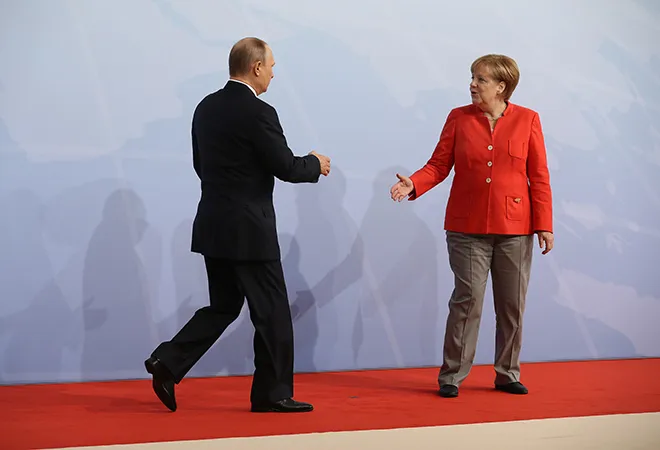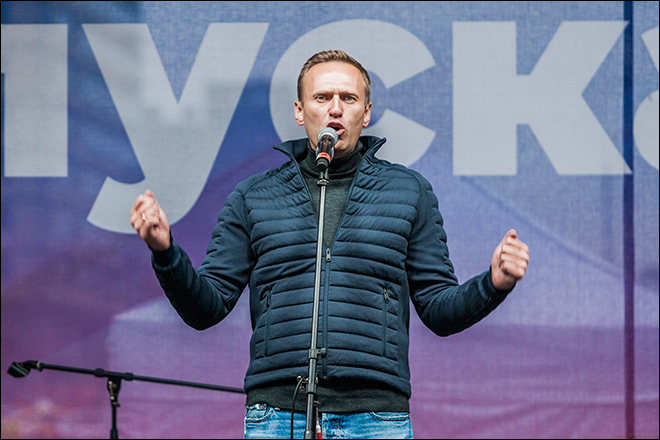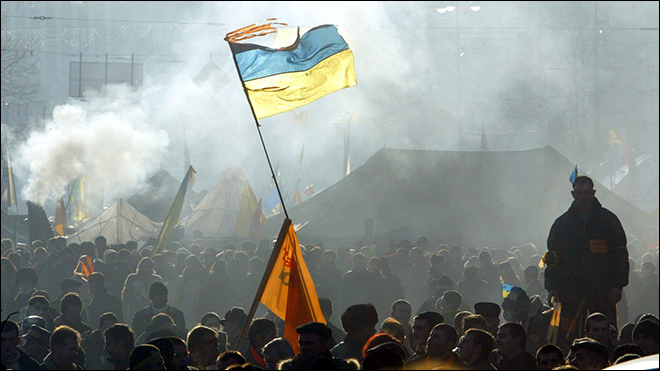
The European Union (EU) imposed sanctions on six Russian officials earlier this month over the poisoning of opposition leader Alexei Navalny. The push for EU travel bans and asset freezes came from Germany and France, days after the Organisation for the Prohibition of Chemical Weapons (OPCW) confirmed that the blood samples taken from Navalny had traces of banned nerve-agent Novichok, which would make the poisoning a contravention of the Chemical Weapons Convention. Earlier, laboratories in Germany, France and Sweden had also come to same conclusion. Navalny had been flown to Berlin for treatment three days after falling ill on a plane journey on 20 August.
The sanctions came even as foreign minister Sergei Lavrov issued a stern warning that Moscow could freeze its relations with the EU in response to such an action from the European body. Russia has denied the latest charges of poisoning at the highest level, with President Vladimir Putin calling for a joint investigation.
The immediate fallout
German Chancellor Angela Merkel has been called upon to take a tougher stance on Russia over the poisoning and she has herself demanded an explanation from Moscow, while also visiting Navalny in the hospital in an important signal. This coupled with the latest talk of sanctions has led to questions about the impact of these developments on the Russia-Germany relationship that is a key component of Moscow’s engagement with Europe.
The latest sanctions over Navalny’s poisoning targeting specific individuals would be yet another addition to the long list of complaints that Europe and Russia have traded in the past decade.
While targeted sanctions will hurt individuals, they will only add to the whole gamut of already existing ones that have been imposed by the EU and the US on Russia over Ukraine crisis and MH17 crash (2014), attempted interference in US presidential elections (2016) as well as the Skripal poisonings in the UK (2018). In fact, it was the use of Novichok to poison former Russian spy Sergei Skripal by two suspected Russian agents that led the EU to introduce a mechanism allowing it to sanction and punish chemical attacks ‘using banned munitions, regardless of nationality.’
 The push for EU travel bans and asset freezes came from Germany and France, days after the Organisation for the Prohibition of Chemical Weapons confirmed that the blood samples taken from Alexei Navalny had traces of banned nerve-agent Novichok. Photo: Celestino Arce — NurPhoto via Getty
The push for EU travel bans and asset freezes came from Germany and France, days after the Organisation for the Prohibition of Chemical Weapons confirmed that the blood samples taken from Alexei Navalny had traces of banned nerve-agent Novichok. Photo: Celestino Arce — NurPhoto via Getty
This whole gamut of individual and sectoral sanctions, which Russia sees as long-lasting and illegitimate, have not led to a visible change of its foreign policy behaviour; raising questions over their efficacy in the absence of a clear plan of action for the future. The latest sanctions over Navalny’s poisoning targeting specific individuals would be yet another addition to the long list of complaints that Europe and Russia have traded in the past decade.
Another fear was expressed regarding the possible fallout on Nord Stream 2, the gas pipeline connecting Russia to Germany under the Baltic Sea that is close to completion. In 2019, EU-27 imported 44.7 percent of its natural gas from Russia while the figure for oil stood at 28 percent. In the case of Germany, the figures were at 31.5 and 40 percent respectively. For Russia, despite an increase in exports to Asian markets, Europe remains the primary destination for its natural resources. The US and some countries in the EU have argued for a long time that the new pipeline will make Europe even more dependent on Russian gas.
For Russia, despite an increase in exports to Asian markets, Europe remains the primary destination for its natural resources.
Till now, Berlin has brushed aside concerns of over-dependence and pointed out that it needs the natural gas from Nord Stream 2 as it seeks to increase the consumption of cleaner fuels in its energy mix in a cost-effective manner. After the poisoning came to light, for the first time Germany indicated that it was open to debating the future of the pipeline. However, the benefits accruing via Nord Stream 2 as well as the last stage of its completion have meant that shelving the project is an unsavoury option for both sides. This was evident in Germany’s response to expanded US sanctions against the Nord Stream 2 in recent days, where it insisted on its sovereign right to make policy decisions on energy imports. Russia too remains committed to the project and has maintained it will complete the construction work despite sanctions. Given the previous track record and the advanced nature of the project, scrapping of Nord Stream 2 looks highly unlikely.
READ | Russia, EU and Nord Stream 2: Economics versus geopolitics
Over the years, despite a growing estrangement between Russia and the EU, Germany has insisted that the pipeline project goes ahead. This has been part of German efforts to keep its economic and commercial decision-making separate from political developments in the case of Nord Stream 2. Putin too has highlighted the special trade and investment ties between the two countries that serve the national interests of both sides.
The bigger picture
Meanwhile, even as the immediate fallout of Navalny poisoning continues to unravel, the steady slide of the bilateral Russia-Germany relationship can hardly be denied. After a largely cordial relationship in the first two decades after collapse of the Soviet Union, where the Russia-Germany relationship grew steadily in the economic and political domain, the last decade has seen increasing dissatisfaction on both sides.
After the Ukrainian crisis, from the European side, it was Merkel who maintained regular contact with Putin.
In the case of Russia, even before the Ukrainian crisis and the annexation of Crimea led to a breakdown of relations with the West, the disenchantment with the EU had been growing. The key reasons for this were the eastwards expansion of NATO, colour revolutions and differences over missile defence. In fact, given this prevailing situation, both Germany and the EU have been criticised for failing to ‘anticipate’ Russian reaction to the association agreement with Ukraine in 2014. Russia recognises that its vision of a Greater Europe from Lisbon to Vladivostok is no longer tenable.
Despite these challenges, scholars note that unlike other EU states, Berlin continued to ‘strike a balance’ in its relations with Russia. After the Ukrainian crisis, from the European side, it was Merkel who maintained regular contact with Putin. Arguing against a military solution and provoking Russia again, the German side preferred to negotiate the Minsk ceasefire agreements alongside Moscow.
 Twelfth day of the Orange Revolution in Kiev, Ukraine — 3 December 2004. Photo: Sergey Supinski/AFP via Getty
Twelfth day of the Orange Revolution in Kiev, Ukraine — 3 December 2004. Photo: Sergey Supinski/AFP via Getty
But this does not mean that German policy is completely at odds with the EU and US policy, and as noted above, Berlin has been part of strict sanctions imposed on Russia since 2014. Especially after the Ukrainian crisis, there was a change in Germany wherein despite strong economic linkages, the government convinced the business lobby to get on board the tough sanctions being imposed on Russia. Given that Germany is an integral part of the EU and trans-Atlantic alliance system, it is unlikely that a major shift away from this policy will take place in favour of Russia. This situation has been compounded by other specific German grievances for which it has blamed Moscow including the 2015 hack of its Parliament, fueling of anti-migrant sentiment through fake news and killing of a former rebel Chechen commander in Berlin. These incidents have added to the distrust between the two sides and Russian denials have not found credence in Germany.
Given that Germany is an integral part of the EU and trans-Atlantic alliance system, it is unlikely that a major shift away from this policy will take place in favour of Russia.
All of these developments together have led to a sense that the growing rift in Russia-Europe relations mean that while Germany continues to keep the option of ‘diplomacy and negotiation’ open, it is no longer playing the ‘special role’ of being ‘the chief interlocutor for Russia in Europe.’
The pragmatic way
As Germany tries to strike a balance in its relations with Russia and as the latter reorients its policy with a focus on Eurasia, the expectations on both sides from each other have declined. Neither side has shown a willingness to back down on their positions that have in recent years led to what has been described as ‘stagnation and muddling through’ in the Russia-Germany relationship. The latest case of Alexei Navalny is, therefore, expected to become yet another point of contention between the two sides instead of marking a new shift and at this point, the prevailing state of affairs is likely to continue.
The leading factor here is the economic and energy linkages between the two countries, with Germany being the second largest trade partner for Russia in 2018.
Given the uncertainty in the global order, it is important that Berlin and Moscow take steps to address this deterioration in bilateral ties. There exist mutual areas of cooperation that need them to continue a pragmatic engagement despite the challenges. And it is this pursuit of ‘mutual interest’ instead of an ‘ambition to play a special role’ that will drive the relations, as Putin indicated in his recent remarks at the Valdai Discussion Club.
The leading factor here is the economic and energy linkages between the two countries, with Germany being the second largest trade partner for Russia in 2018. Among all EU members, Germany is the largest importer of goods from Russia as well as the largest exporter. In addition, there are issues of regional and global importance that require regular diplomatic engagement between the two sides. Apart from being key interlocutors of the Normandy format on Ukraine, they also have a common interest in preserving the Iran nuclear deal after US unilateral withdrawal. Their bilateral relationship also forms an important pillar of European stability.
These provide specific, well-defined areas of coordination that must be used to stabilize the situation. It would result in a more limited, issue-based cooperation but that would be a better outcome than a breakdown of the diplomatic process.
The views expressed above belong to the author(s). ORF research and analyses now available on Telegram! Click here to access our curated content — blogs, longforms and interviews.




 The push for EU travel bans and asset freezes came from Germany and France, days after the Organisation for the Prohibition of Chemical Weapons confirmed that the blood samples taken from Alexei Navalny had traces of banned nerve-agent Novichok. Photo: Celestino Arce — NurPhoto via Getty
The push for EU travel bans and asset freezes came from Germany and France, days after the Organisation for the Prohibition of Chemical Weapons confirmed that the blood samples taken from Alexei Navalny had traces of banned nerve-agent Novichok. Photo: Celestino Arce — NurPhoto via Getty Twelfth day of the Orange Revolution in Kiev, Ukraine — 3 December 2004. Photo: Sergey Supinski/AFP via Getty
Twelfth day of the Orange Revolution in Kiev, Ukraine — 3 December 2004. Photo: Sergey Supinski/AFP via Getty PREV
PREV


